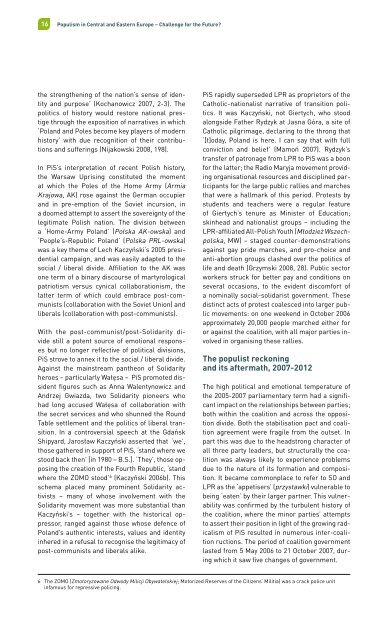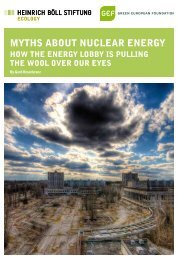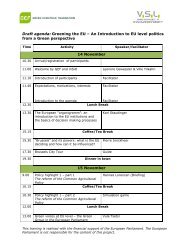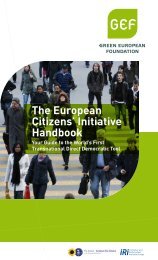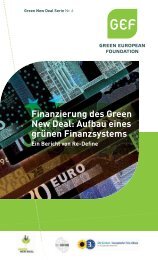Populism in Central and Eastern Europe â Challenge for the Future?
Populism in Central and Eastern Europe â Challenge for the Future?
Populism in Central and Eastern Europe â Challenge for the Future?
- No tags were found...
Create successful ePaper yourself
Turn your PDF publications into a flip-book with our unique Google optimized e-Paper software.
16 <strong>Populism</strong> <strong>in</strong> <strong>Central</strong> <strong>and</strong> <strong>Eastern</strong> <strong>Europe</strong> – <strong>Challenge</strong> <strong>for</strong> <strong>the</strong> <strong>Future</strong><br />
<strong>the</strong> streng<strong>the</strong>n<strong>in</strong>g of <strong>the</strong> nation’s sense of identity<br />
<strong>and</strong> purpose’ (Kochanowicz 2007, 2-3). The<br />
politics of history would restore national prestige<br />
through <strong>the</strong> exposition of narratives <strong>in</strong> which<br />
‘Pol<strong>and</strong> <strong>and</strong> Poles become key players of modern<br />
history’ with due recognition of <strong>the</strong>ir contributions<br />
<strong>and</strong> suffer<strong>in</strong>gs (Nijakowski 2008, 198).<br />
In PiS’s <strong>in</strong>terpretation of recent Polish history,<br />
<strong>the</strong> Warsaw Upris<strong>in</strong>g constituted <strong>the</strong> moment<br />
at which <strong>the</strong> Poles of <strong>the</strong> Home Army (Armia<br />
Krajowa, AK) rose aga<strong>in</strong>st <strong>the</strong> German occupier<br />
<strong>and</strong> <strong>in</strong> pre-emption of <strong>the</strong> Soviet <strong>in</strong>cursion, <strong>in</strong><br />
a doomed attempt to assert <strong>the</strong> sovereignty of <strong>the</strong><br />
legitimate Polish nation. The division between<br />
a ‘Home-Army Pol<strong>and</strong>’ (Polska AK-owska) <strong>and</strong><br />
‘People’s-Republic Pol<strong>and</strong>’ (Polska PRL-owska)<br />
was a key <strong>the</strong>me of Lech Kaczyński’s 2005 presidential<br />
campaign, <strong>and</strong> was easily adapted to <strong>the</strong><br />
social / liberal divide. Affiliation to <strong>the</strong> AK was<br />
one term of a b<strong>in</strong>ary discourse of martyrological<br />
patriotism versus cynical collaborationism, <strong>the</strong><br />
latter term of which could embrace post-communists<br />
(collaboration with <strong>the</strong> Soviet Union) <strong>and</strong><br />
liberals (collaboration with post-communists).<br />
With <strong>the</strong> post-communist/post-Solidarity divide<br />
still a potent source of emotional responses<br />
but no longer reflective of political divisions,<br />
PiS strove to annex it to <strong>the</strong> social / liberal divide.<br />
Aga<strong>in</strong>st <strong>the</strong> ma<strong>in</strong>stream pan<strong>the</strong>on of Solidarity<br />
heroes – particularly Wałęsa – PiS promoted dissident<br />
figures such as Anna Walentynowicz <strong>and</strong><br />
Andrzej Gwiazda, two Solidarity pioneers who<br />
had long accused Wałęsa of collaboration with<br />
<strong>the</strong> secret services <strong>and</strong> who shunned <strong>the</strong> Round<br />
Table settlement <strong>and</strong> <strong>the</strong> politics of liberal transition.<br />
In a controversial speech at <strong>the</strong> Gdańsk<br />
Shipyard, Jarosław Kaczyński asserted that ‘we’,<br />
those ga<strong>the</strong>red <strong>in</strong> support of PiS, ‘st<strong>and</strong> where we<br />
stood back <strong>the</strong>n’ [<strong>in</strong> 1980 – B.S.]. ‘They’, those oppos<strong>in</strong>g<br />
<strong>the</strong> creation of <strong>the</strong> Fourth Republic, ‘st<strong>and</strong><br />
where <strong>the</strong> ZOMO stood’ 6 (Kaczyński 2006b). This<br />
schema placed many prom<strong>in</strong>ent Solidarity activists<br />
– many of whose <strong>in</strong>volvement with <strong>the</strong><br />
Solidarity movement was more substantial than<br />
Kaczyński’s – toge<strong>the</strong>r with <strong>the</strong> historical oppressor,<br />
ranged aga<strong>in</strong>st those whose defence of<br />
Pol<strong>and</strong>’s au<strong>the</strong>ntic <strong>in</strong>terests, values <strong>and</strong> identity<br />
<strong>in</strong>hered <strong>in</strong> a refusal to recognise <strong>the</strong> legitimacy of<br />
post-communists <strong>and</strong> liberals alike.<br />
PiS rapidly superseded LPR as proprietors of <strong>the</strong><br />
Catholic-nationalist narrative of transition politics.<br />
It was Kaczyński, not Giertych, who stood<br />
alongside Fa<strong>the</strong>r Rydzyk at Jasna Góra, a site of<br />
Catholic pilgrimage, declar<strong>in</strong>g to <strong>the</strong> throng that<br />
‘[t]oday, Pol<strong>and</strong> is here. I can say that with full<br />
conviction <strong>and</strong> belief’ (Mamoń 2007). Rydzyk’s<br />
transfer of patronage from LPR to PiS was a boon<br />
<strong>for</strong> <strong>the</strong> latter; <strong>the</strong> Radio Maryja movement provid<strong>in</strong>g<br />
organisational resources <strong>and</strong> discipl<strong>in</strong>ed participants<br />
<strong>for</strong> <strong>the</strong> large public rallies <strong>and</strong> marches<br />
that were a hallmark of this period. Protests by<br />
students <strong>and</strong> teachers were a regular feature<br />
of Giertych’s tenure as M<strong>in</strong>ister of Education;<br />
sk<strong>in</strong>head <strong>and</strong> nationalist groups – <strong>in</strong>clud<strong>in</strong>g <strong>the</strong><br />
LPR-affiliated All-Polish Youth (Młodzież Wszechpolska,<br />
MW) – staged counter-demonstrations<br />
aga<strong>in</strong>st gay pride marches, <strong>and</strong> pro-choice <strong>and</strong><br />
anti-abortion groups clashed over <strong>the</strong> politics of<br />
life <strong>and</strong> death (Grzymski 2008, 28). Public sector<br />
workers struck <strong>for</strong> better pay <strong>and</strong> conditions on<br />
several occasions, to <strong>the</strong> evident discom<strong>for</strong>t of<br />
a nom<strong>in</strong>ally social-solidarist government. These<br />
dist<strong>in</strong>ct acts of protest coalesced <strong>in</strong>to larger public<br />
movements: on one weekend <strong>in</strong> October 2006<br />
approximately 20,000 people marched ei<strong>the</strong>r <strong>for</strong><br />
or aga<strong>in</strong>st <strong>the</strong> coalition, with all major parties <strong>in</strong>volved<br />
<strong>in</strong> organis<strong>in</strong>g <strong>the</strong>se rallies.<br />
The populist reckon<strong>in</strong>g<br />
<strong>and</strong> its aftermath, 2007-2012<br />
The high political <strong>and</strong> emotional temperature of<br />
<strong>the</strong> 2005-2007 parliamentary term had a significant<br />
impact on <strong>the</strong> relationships between parties;<br />
both with<strong>in</strong> <strong>the</strong> coalition <strong>and</strong> across <strong>the</strong> opposition<br />
divide. Both <strong>the</strong> stabilisation pact <strong>and</strong> coalition<br />
agreement were fragile from <strong>the</strong> outset. In<br />
part this was due to <strong>the</strong> headstrong character of<br />
all three party leaders, but structurally <strong>the</strong> coalition<br />
was always likely to experience problems<br />
due to <strong>the</strong> nature of its <strong>for</strong>mation <strong>and</strong> composition.<br />
It became commonplace to refer to SO <strong>and</strong><br />
LPR as <strong>the</strong> ‘appetisers’ (przystawki) vulnerable to<br />
be<strong>in</strong>g ‘eaten’ by <strong>the</strong>ir larger partner. This vulnerability<br />
was confirmed by <strong>the</strong> turbulent history of<br />
<strong>the</strong> coalition, where <strong>the</strong> m<strong>in</strong>or parties’ attempts<br />
to assert <strong>the</strong>ir position <strong>in</strong> light of <strong>the</strong> grow<strong>in</strong>g radicalism<br />
of PiS resulted <strong>in</strong> numerous <strong>in</strong>ter-coalition<br />
ructions. The period of coalition government<br />
lasted from 5 May 2006 to 21 October 2007, dur<strong>in</strong>g<br />
which it saw five changes of government.<br />
6 The ZOMO (Zmotoryzowane Odwody Milicji Obywatelskiej; Motorized Reserves of <strong>the</strong> Citizens’ Militia) was a crack police unit<br />
<strong>in</strong>famous <strong>for</strong> repressive polic<strong>in</strong>g.


